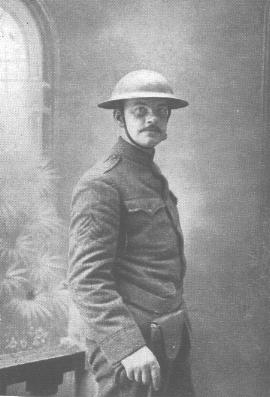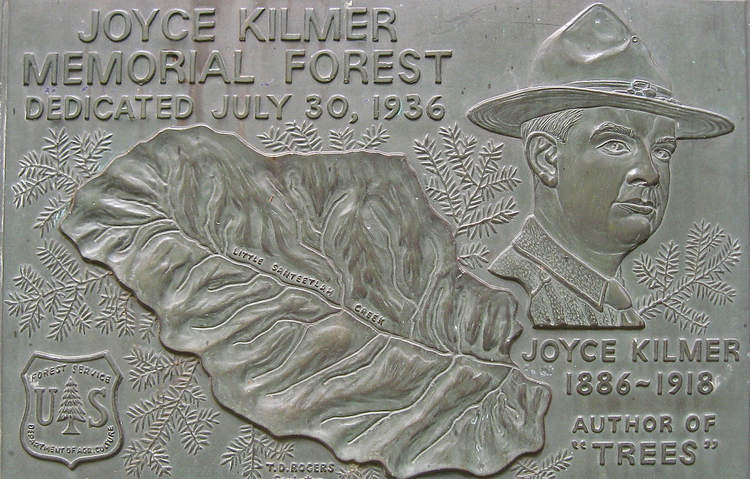Joyce Kilmer was killed by a German sniper’s bullet 100 years ago this summer, on July 30, 1918, during the Second Battle of the Marne in World War I. The celebrated writer is best known for his 1913 poem “Trees.”
I think that I shall never see
A poem lovely as a tree.A tree whose hungry mouth is prest
Against the earth’s sweet flowing breast;A tree that looks at God all day,
And lifts her leafy arms to pray;A tree that may in Summer wear
A nest of robins in her hair;Upon whose bosom snow has lain;
Who intimately lives with rain.Poems are made by fools like me,
But only God can make a tree
Literary critics, from Kilmer’s time to the present, fault the poem as being overly sentimental and romantic. Yet many readers, then and now, find the poem charming and see nothing wrong with being sentimental.
There is, however, much more to Joyce Kilmer’s story than this one well-known poem.
Born on Dec. 6, 1886, in New Brunswick, N.J., to parents Annie and Frederick Kilmer, he was named Alfred Joyce Kilmer. (His father was the inventor of Johnson & Johnson’s Baby Powder.)

Kilmer studied at Rutgers College Grammar School, where he was the editor of the school’s paper. He went on to Rutgers College and Columbia University, graduating in May 1908. He married Aline Murray in June, and they would eventually have five children. In the following years, Kilmer became a well-known poet, literary critic, journalist and editor. He started teaching Latin at Morristown High School in New Jersey and writing essays, poems and reviews for several publications including The Nation and The New York Times.
He and Aline moved to New York, where he held several jobs, including working for Funk and Wagnall’s defining words for The Standard Dictionary. In 1912, the Jesuit priest James Daly, a professor of English at Campion College in Prairie du Chien, Wis., wrote to Kilmer to discuss literature. The two began exchanging letters, and a friendship developed that intensified when Kilmer’s fourth child, baby Rose, was stricken with polio and lost the use of her limbs. His relationship with Father Daly led Kilmer and his wife to become Catholics in 1913, the same year Kilmer published “Trees.” Kilmer would write to Father Daly on Jan. 9, 1914:
I believed in the Catholic position, the Catholic view of ethics and aesthetics, for a long time. But I wanted something not intellectual, some conviction not mental—in fact I wanted Faith....
Well, every morning for months I stopped on my way to the office and prayed in this church for faith. When faith did come, it came, I think, by way of my little paralysed daughter. Here lifeless hands led me; I think her tiny still feet know beautiful paths. You understand this and it gives me a selfish pleasure to write it down.
Kilmer often visited Campion, where he also became friends with Claude Pernin, S.J. Father Pernin, who taught English at the school, was a brilliant lecturer who later became a pioneer in radio in Chicago in the 1920s. Pernin gave comments and criticisms to the manuscripts of many of Kilmer’s poems and essays. Kilmer wrote several books, including The Circus and Other Essays (1916); Main Street and Other Poems (1917); and Literature in the Making (1917). In 1917, he also published Dreams and Images: An Anthology of Catholic Poets, which was dedicated to Father Daly and included the poems of four Jesuits. In his time, Kilmer was compared to British contemporaries Hilaire Belloc and G. K. Chesterton. He was considered the leading American Catholic lecturer and poet of his time.
Kilmer was considered the leading American Catholic lecturer and poet of his time.
In April 1917, the United States entered World War I. Kilmer enlisted, joining New York City’s “Fighting 69th” infantry regiment: “I was Irish and Catholic and would go to France sooner.” The 69th was led by Major “Wild Bill” Donovan, and the chaplain was the Rev. Francis P. Duffy. Shortly before Kilmer left to go overseas, his daughter Rose died. In France, Kilmer was a dedicated and courageous soldier, often undertaking dangerous reconnaissance missions. A fellow soldier, Sergeant Major Ester, described Kilmer:
He would always be doing more than his orders called for, i.e., getting much nearer to the enemy’s positions than any officer would be inclined to send him. Night after night he would lie out in No Man’s Land, crawling through barbed wires, in an effort to locate enemy positions and enemy guns, and tearing his clothes to shreds.
The German sniper brought him down on one such mission, and he was buried in France. He was posthumously awarded the Croix de Guerre. Father Duffy’s heroic efforts in the war, such as going into battle to carry back the wounded, would lead him to become the most decorated cleric in the history of the United States Army. A statue of Father Duffy stands in Duffy Square at the north end of Times Square in Manhattan.

Almost 20 years after the poet’s death, Father Pernin received an inheritance that he donated to build the Joyce Kilmer Library at Campion High School (the college had closed in 1925). The library was dedicated in 1937 and contained a display of Kilmer’s correspondence with Father Daly.
In 1940, Kilmer was portrayed by Jeffrey Lynn in the film “The Fighting 69th,” starring James Cagney, with Pat O’Brien as Father Duffy. In the movie, Kilmer is seen autographing his book of poetry and then composing a poem as the troops march through the mud. The film depicts the German bombardment on March 7, 1918, at the Rouge Bouquet wood. Nineteen men from Kilmer’s unit die when a shell hits the roof of their dugout, which collapses, trapping the men inside. At their burial Kilmer reads his poem “Rouge Bouquet”:
In a wood they call the Rouge Bouquet
There is a new-made grave to-day,
Built by never a spade nor pick
Yet covered with earth ten metres thick.
There lie many fighting men,
Dead in their youthful prime,
Never to laugh nor love again
Nor taste the Summertime.
For Death came flying through the air
And stopped his flight at the dugout stair,
Touched his prey and left them there,
Clay to clay.
He hid their bodies stealthily
In the soil of the land they fought to free
And fled away.
Now over the grave abrupt and clear
Three volleys ring;
And perhaps their brave young spirits hear
The bugle sing:
“Go to sleep!
Go to sleep!
Slumber well where the shell screamed and fell.
Let your rifles rest on the muddy floor,
You will not need them any more.
The poem goes on to reference the archangel Michael and three Irish saints, begging their aid from heaven.
Kilmer’s popularity is evidenced by the many things named after him, including eight schools (four of which are in New Jersey), an Army camp, several parks and roads and the Joyce Kilmer Memorial Forest, which is 3,800 acres of virgin forest in North Carolina. A monument to him stands in Central Park.
Several creative geniuses survived the First World War: Ernest Hemingway, Teilhard de Chardin, Paul Tillich and Walt Disney, among others. These men and their contemporaries were often called the “Lost Generation.” But the Lost Generation also includes creative figures who died in the war, men like Kilmer and the composers Enrique Granados and George Butterworth.
What more would Kilmer have accomplished if he had lived? What if he had survived and studied the poetry of Wilfred Owen and Siegfried Sassoon? They wrote of the horrors of war and broke the rules of poetry. Surely Kilmer’s poetry would have evolved. F. Scott Fitzgerald’s classic The Great Gatsby is about frivolous and careless people after the war. Might Kilmer have written a novel about people with purpose and vision in the wake of world war, ones who were not so lost?
Like Fitzgerald, Kilmer could have become a unique and influential literary voice in the Roaring Twenties and the Depression—and a specifically Catholic one. The American Catholic literary revival developed in the 1930s, calling for the creation of high quality, engaging, Catholic writing. Kilmer could have led the movement.











Thank you for your historic depiction of Joyce Kilmer. My father fought in WWI and saw Kilmer as a light in the darkness. He, too , had attended Campion prior to the war, knew of Kilmer and of his death not far from where he also engaged in combat. He named one of his sons Joyce to honor the poet, As time went on our culture lost touch with who Kilmer was, and my brother suffered much ridicule because of the name which, by that time, was seen only as a feminine one. Kilmer was one of the “some” who gave all to his country, not just by his courageous behavior in battle, but by his literary talent.
While I appreciate the tragedy of Kilmer's life and death, it seems pure folly that a man with a wife and four young children should willingly go to war and undertake perilous missions with a disregard for his own life that seems almost suicidal .... ultimately leaving his family to fend for themselves. There may have been a perceived moral imperative during World War I but there was a more immediate moral imperative that Kilmer owed his family. I realize this is harshly judgmental but history does offer perspective.
There was no moral reason for the US to enter WWI. The reason was economic because of all the money owed by Britain and France to Wall Street. If we hadn't entered the war, it might have petered out without winners and the punitive Versailles Treaty might not have engendered the Nazis and WWII. That being said, Kilmer felt a sense of duty to his country, something beyond selfishness and even the hard altruism of family. We could use that now when people vote as if if it's good for me, it's good for my country.
I can appreciate your comment. My mother's mother died in the Spanish flu epidemic in Ireland. Not from the flu--she never contracted it--but from nursing her family and the families of neighbors. She died of exhaustion, leaving behind 20 children (11 adopted from her sister killed in a murder suicide by her husband). Even when i was a child in New York my mother was still mad at her for for overextending her kindness and thereby abandoning her children, including my mother's cousins my mother had grown immensely fond of. Her death, as you can imagine, traumatized the cousins, losing their second mother like that. BTW, the family were prosperous Catholic farmers, not at all poor, as the story of Ireland might suggest. They were prosperous for centuries, granted a lease normally granted only to Protestants. That lease was treated as the equivalent of ownership so the fathers always had the right to vote. At least at time time Catholic moral decision making would back up your point and my mother's conviction that what her mother did was wrong.
There is something a parent can give to his/her children that transcends material and emotional support. The willingness to give all for love of neighbor, as your grandmother did, and, in Kilmer's case I suspect the values of democracy, is an example of generosity and magnanimity that will speak again and again in the hearts of their children.
Wonderfully informative article. At PS 166 we had to read “Trees” aloud every Arbor Day.
I grew up in New Brunswick and visited the site of his tree often. As an adult I lived for a time on Joyce Kilmer Ave. It was a joy to discover that he was a Catholic some years back. Nice story--there was a huge propaganda effort to get guys to enlist during that time. Perhaps we can understand a lost soul like Hemingway getting caught up in the violence, but Kilmer should have been able to better think this out. Oh, well. RIP.
For our family vacation last summer, we visited the Joyce Kilmer Forest Preserve in North Carolina. Some of our more intrepid folks hiked up a mile or so to see 450-year-old trees while I stayed below listening to a river and reading the information about those who worked to preserve the site as a Kilmer memorial. It was one of the memorable days of the 2017 summer for me and mine. I'm glad to see the Kilmer story summarized so well in America.